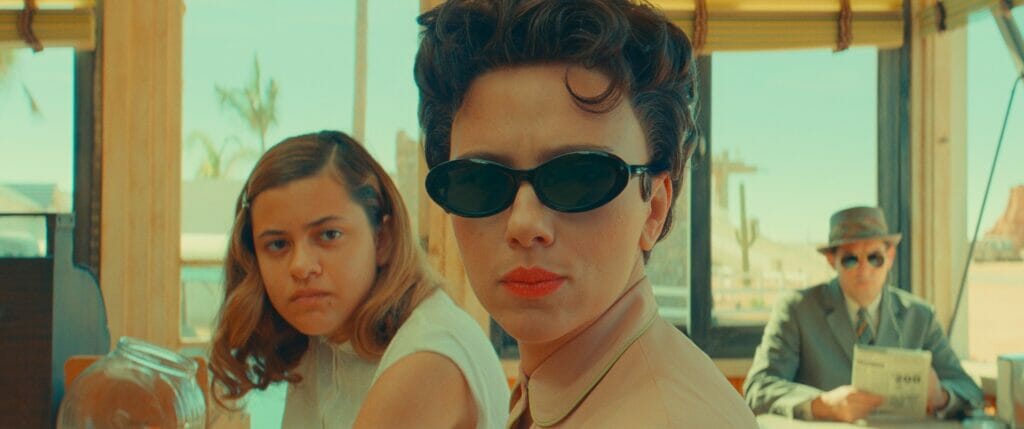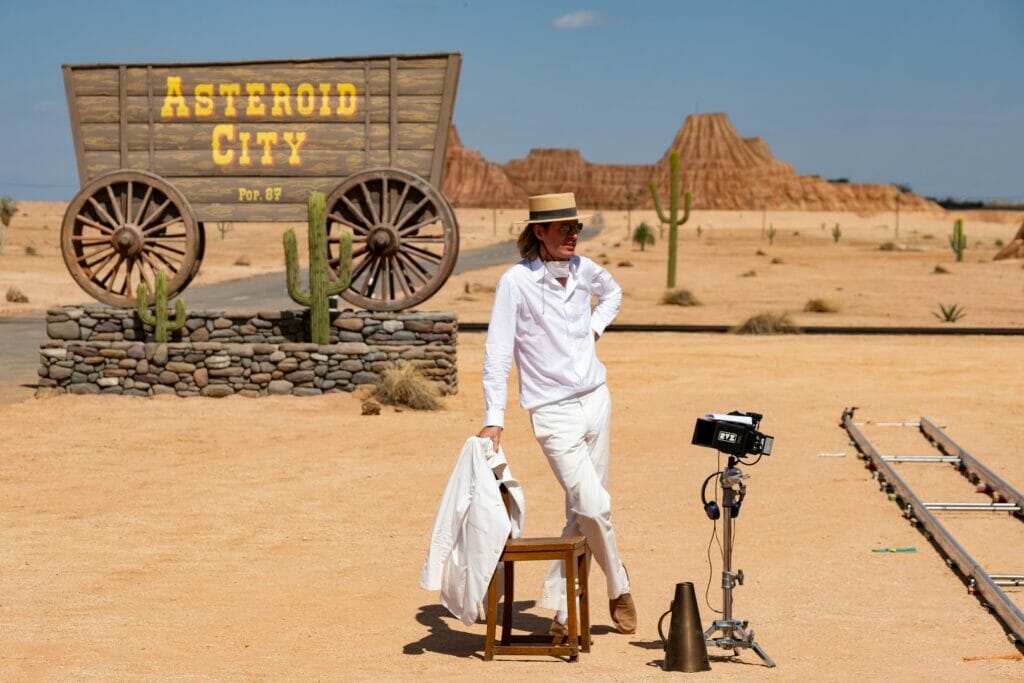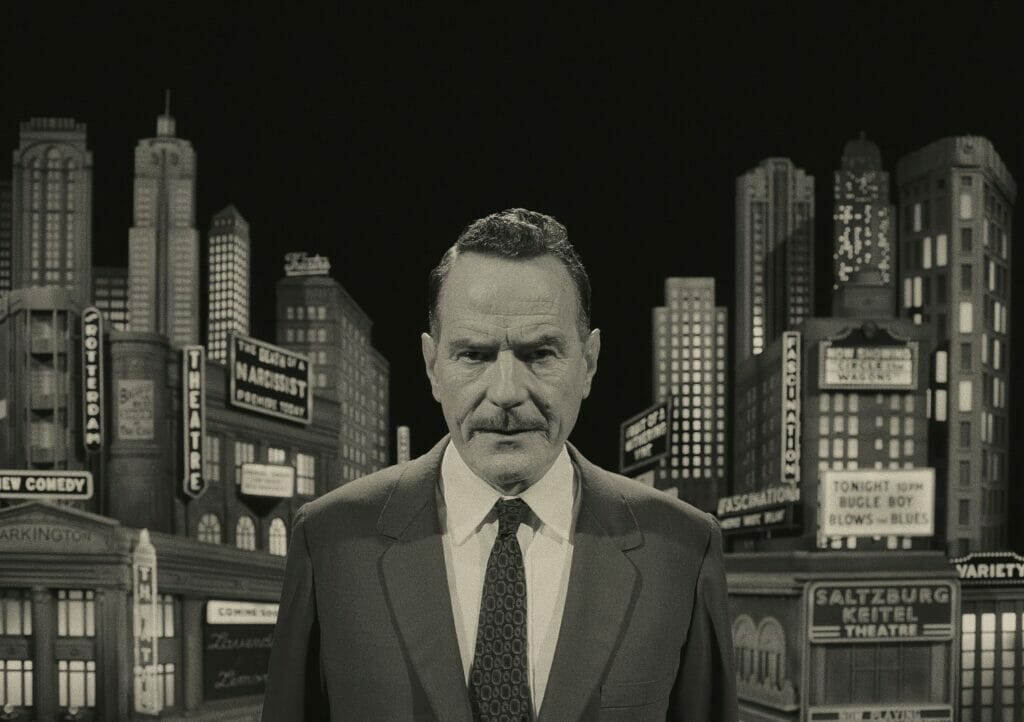Anderson’s latest is maybe his most reflective and curious film yet, a reflection of the ways he keeps old Hollywood forms of storytelling and acting alive.
About twenty miles or so outside of Marfa, Texas, there’s a mural dedicated to the production of George Stevens’ Giant. Big wooden standees display James Dean with his arms draped over a rifle, framing him in the iconic Christ pose which would be the last image to represent Dean in the public consciousness before he died. Giant is about a great number of things, though, fittingly, what resonates all these years later is its ideas about the passing of time.
This manifests in a few ways, from the endearingly false grey wigs on stars Rock Hudson and Elizabeth Taylor to the handover between their performances and the more immediate Method acting of Dean and Dennis Hopper. Giant’s dramatization of Hudson’s slipping grip on his Texan kingdom is mirrored by the slow loss of the old way of making movies and acting for the camera.
Wes Anderson’s Asteroid City is, among other things, about this very shift and the many forms it took, from a mid-century understanding of the future to a more dispiriting version of the future we achieved, from the method acting of Dean to the deliberately arch second-hand version featured in the movie. More specifically, it’s about a meeting of the minds in a desert town (not unlike Marfa) interrupted by proof of alien life. But in every regard, this is a film that takes the idea of scientific change as the catalyst for melodramatic exploration and expression. The film hints at undiscovered galaxies and great unknowns, but the mysteries it’s most interested in are ones of the heart.

It’s the mid-1950s, and Conrad Earp (Edward Norton) has entrusted his newest creation, Asteroid City, to director Schubert Green (Adrien Brody), a mercurial talent at the end of a passionate marriage. Earp’s great discovery is the mop-top firebrand who will be playing the lead, Augie Steenbeck (Jason Schwartzman), who waltzed into Earp’s life and bedroom with an equally cavalier swagger. Asteroid City is being performed as a televised play, but the version of the play we see is, of course, a movie as directed by Wes Anderson — with the requisite meticulous production design, symmetrical gingerbread house framing, deadpan humor, and carefully curated needle drops.
Asteroid City (the film within the film) is about a group of five kids with genius-level intellects (Grace Edwards, Sophia Lillis, Ethan Josh Lee, Aristou Meehan, Jake Ryan) brought to the titular town to compete for grant money from officials of the US Military (Jeffrey Wright), government (Fisher Stevens), and experts in Astronomy (Tilda Swinton) to help advance their burgeoning careers in science. Each has brought a single parent (Schwartzman, Scarlett Johansson, Hope Davis, Liev Schreiber, Steve Park) to chaperone the event, which has also drawn the attention of a school group supervised by a sheltered young woman (Maya Hawke) and singing cowboys (led by Rupert Friend), among others.
When an alien lands during the awards ceremony, the government quarantines the area, and everyone goes a little stir-crazy trying to outwit their captors, which leads to love affairs and strange advances in technology alike.

Wes Anderson has, over his three and a half decades as a director, developed a repertory company of actors and crew members (among them director of photography Robert D. Yeoman, production designer Adam Stockhausen and composer Alexandre Desplat) which helped cement the uncommon purity of mise-en-scene. If you couldn’t have guessed from the images themselves if you were watching a Wes Anderson movie, the faces of Schwartzman, Norton, and Jeff Goldblum among others would have told you just the same. (Missing from Asteroid City, for the first time in Anderson’s career since 1997’s Rushmore, Bill Murray, who contracted COVID during the shoot and was replaced by Steve Carell.)
What Anderson had yet to do since his formulation of the company was make a movie specifically about the stage and the ways in which his company resembles a traditional theatre troupe. This is despite the fact that theatricality is an intrinsic part of Anderson’s style, from the way his characters never change costumes to the demonstrative nature of characters’ names/functions to Schwartzman’s Max Fischer’s role as a theater director in Rushmore.
The method he’s chosen to deliver his love letter to his collaborators is every bit about the continued survival of a mannered form of performance. The framing device finds a narrator (Bryan Cranston, who seems to do his best work for Anderson these days) introducing a Screen Director’s Playhouse-style backstage TV program that explores the dynamic between Earp, Schubert, and their cast. (Willem Dafoe puts in a marvelous turn as a Sanford Meisner/Lee Strasberg-style acting coach who oversees the rehearsals for Asteroid City.) Here, Anderson allows us, for once, a peek behind the curtain at the processes and tortured lives of his collaborators, even if he’s coating them in his own fiction to do so. It’s an admission that his ornately manicured style may be the headline; but without willing participants in the body, his art cannot exist and it certainly can’t draw out the audience’s sympathy.

All throughout the film are paeans to the craft of acting, from the memory game the Junior Stargazers play, deliberately redolent of Actors Studio warm-ups and workshops, to Midge Campbell’s (Johansson, in her best performance since Under The Skin) anxiousness to show Steenbeck her audition, heartened to see someone so deadened by misfortune come alive at her honesty. It would be a mistake, in other words, to write off this collection of actors as a tic, as is so often the laziest response to his work. The surprising thing about Asteroid City is just how surprising it is — from Tom Hanks’ very open turn as Schwartzman’s father-in-law (which seamlessly blends with the Anderson player’s performance style) to the way that a movie meant to be based on a play so rarely feels rehearsed.
As in Giant, Asteroid City is about people anxiously staving off the future in its many different forms, from the deliberate suppression of alien life and technology from the public eye to the way the parents of the Junior Stargazers struggle to prepare for the next chapters of their lives. Steenbeck, a war photographer by trade and thus used to death and destruction, has to tell his children that their mother is dead. Campbell, who is deliberately styled after Giant-era Taylor, has to plan for a future that includes her daughter’s own intellectual and emotional journey while still finding time to worry about her career. Everybody also knows that the arrival of extraterrestrials (to say nothing of the kids’ prize-winning inventions) means that the things they prioritize in life could become meaningless.
As in magisterial Douglas Sirk weepies Magnificent Obsession and All That Heaven Allows, the distance between two people closes thanks to the intervention of technology. Schwartzman and Johansson’s flirtations take on an even more potent air of ennui in the shadow of these developments. What was a casual meeting of two depressed professionals becomes an affecting refusal of life’s empty promises. With Asteroid City, Anderson opens his world of perfect surfaces and Tinkertoy art direction to the spontaneity of the American theater. It’s a bigger risk than he’s taken in many moons, and it has yielded his most quietly profound work in years.
Asteroid City lands in theaters in NY/LA on Friday, June 16, and in Chicago/everywhere on Friday, June 23.
Asteroid City Trailer:
Read next: The Spool's Best New Releases
Streaming guides
The Best Live TV Streaming Services With Free Trial
The praises of live TV streaming services don’t need to be further sung. By now, we all know that compared to clunky, commitment-heavy cable, live TV is cheaper and much easier to manage. But just in case you’re still on the fence about jumping over to the other side, or if you’re just unhappy with ... The Best Live TV Streaming Services With Free Trial
How to Watch Power Book III: Raising Kanan Season 3
Season 3 of the hotly anticipated Power spin-off, Power Book III: Raising Kanan, is arriving on Starz soon, so you know what that means: it’s the ’90s again in The Southside, and we’re back with the Thomas family as they navigate the ins and outs of the criminal underworld they’re helping build. Mekai Curtis is ... How to Watch Power Book III: Raising Kanan Season 3
How to Watch Doctor Who: 60th Anniversary Specials
Ladies and gentlemen, we’re so back! To celebrate Doctor Who’s 60th anniversary, the BBC is producing a three-episode special starring none other than the Tenth/Fourteenth Doctor himself, David Tennant. And to the supreme delight of fans (that would be me, dear reader), the Doctor will be joined by old-time companion Donna Noble (Catherine Tate) and ... How to Watch Doctor Who: 60th Anniversary Specials
Which Netflix Country has Interstellar?
Maybe you’ve just seen Oppenheimer and have the strongest urge to marathon—or more fun yet, rank!—all of Christopher Nolan’s films. Or maybe you’re one of the few who haven’t seen Interstellar yet. If you are, then you should change that immediately; the dystopian epic is one of Nolan’s best, and with that incredible twist in ... Which Netflix Country has Interstellar?
Which Netflix Country Has Each Movie of The Hunger Games?
For whatever reason, The Hunger Games series isn’t available in the same countries around the world. You’ll find the first and second (aka the best) installments in Hong Kong, for instance, but not the third and fourth. It’s a frustrating dilemma, especially if you don’t even have a single entry in your region, which is ... Which Netflix Country Has Each Movie of The Hunger Games?
How to Watch ESPN With A Free Trial
One of the major concerns people have before cutting the cord is potentially losing access to live sports. But the great thing about live TV streaming services is that you never lose that access. Minus the contracts and complications of cable, these streaming services connect you to a host of live channels, including ESPN. So ... How to Watch ESPN With A Free Trial
How to Watch Paramount Network With a Free Trial
To date, Paramount Network has only two original shows on air right now: Yellowstone and Bar Rescue. The network seems to have its hands full with on-demand streaming service Paramount+, which is constantly stacked with a fresh supply of new shows. But Yellowstone and Bar Rescue are so sturdy and expansive that the network doesn’t ... How to Watch Paramount Network With a Free Trial
How to Watch WE TV With a Free Trial
Previously “Women’s Entertainment,” We TV has since rebranded to accurately reflect its name and be a more inclusive lifestyle channel. It’s home to addictive reality gems like Bold and Bougie, Bridezillas, Marriage Boot Camp, and The Untold Stories of Hip Hop. And when it’s not airing original titles, it has on syndicated shows like 9-1-1, ... How to Watch WE TV With a Free Trial
How to Watch TNT Sports With A Free Trial
For many sports fans, TNT is a non-negotiable. It broadcasts NBA, MLB, NHL, college basketball, and All Elite Wrestling matches. And, as a bonus, it also has reruns of shows like Supernatural, Charmed, and NCIS, as well as films like The Avengers, Dune, and Justice League. But while TNT used to be a cable staple, ... How to Watch TNT Sports With A Free Trial
How to Watch Comedy Central With a Free Trial
It’s no coincidence that many of today’s biggest comedians found their footing on Comedy Central: the channel is a bastion of emerging comic talents. It served as a playground for people like Nathan Fielder (Fielder For You), Ilana Glazer and Abbi Jacobson (Broad City), Tim Robinson (Detroiters), and Dave Chappelle (Chappelle’s Show) before they shot ... How to Watch Comedy Central With a Free Trial
How to Watch FX With a Free Trial
You’d be hard-pressed to find a bad show airing on FX. The channel has made a name for itself as a bastion of high-brow TV, along with HBO and AMC. It’s produced shows like Atlanta, Fargo, The Americans, Archer, and more recently, Shogun. But because it’s owned by Disney, it still airs several blockbusters in ... How to Watch FX With a Free Trial